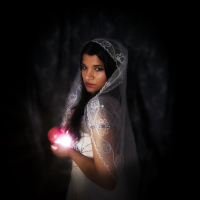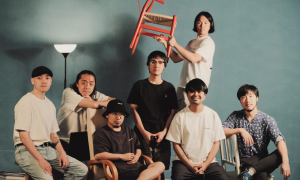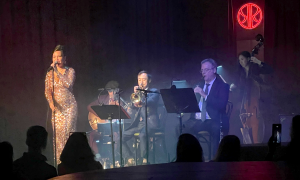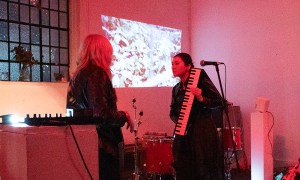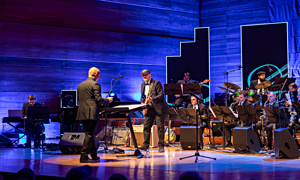Home » Jazz Articles » Live Review » Gent Jazz Festival 2010: Days 6-9
Gent Jazz Festival 2010: Days 6-9
The Gent Jazz Festival
Bijloke
Gent, Belgium
July 15-18, 2010
It's now customary to expect the biggest players in the jazz universe to alight each night at the Gent Jazzfest. This massively historic Belgian city provides a beautiful setting for the music, with its Bijloke site situated just outside the main centre, in a universe of its own making. The large marquee set-up is now an established success, oscillating between seated rows for the first week's hardcore jazz sequence, and then converting to a standing dancefloor scenario for the second week's concentration on the peripheries of jazz. This year, that meant Brazilian music, Portuguese fado, jazztronica, soul-poetics and blues-rock bombast. Each night, the area surrounding the main marquee sprawls outwards with bars and food stalls, the imbibers and grazers entertained by a series of mood-enhancing DJs. Humid heat pervaded, with a downpour descending on only one night. Better to be damp with sweat secretions than chemical rain, surely? [read our July 7-11 report]
July 15: Gilberto Gil/Mariza/Cibelle
Just as Norah Jones played to a standing crowd during the normally seated first week of the festival, this first night of its second phase once again switched the rules. A night of Portuguese centred music mostly demanded that the chairs remained. The marquee would only become an all-standing zone on the following night. The evening benefited from a masterstroke of sympathetic programming, uniting artists from Brazil and Portugal, although the opening Cibelle chose to sing mostly in English.
Originally from São Paulo, Cibelle now lives in London. She's signed to the very diverse Crammed Records, of Brussels. The singer's onstage attitude, and the make-up of her band, certainly suggest an English glam-pop lineage. Surely, Cibelle must be partially influenced by Goldfrapp. It's always welcome to view a band who pay attention to sculpting their stage environment. Cibelle had overseen the complete draping of all instruments and microphone stands with brightly-hued, spangled fabrics, with glittery tendrils winding around any available limb. She aims to transform her space into an alternate environment of exotic colour and texture. This is also her primary desire when creating a songworld.
It's a shame that following all of this effort with set and garb that the actual music fell short of its intended mystery, depth, campness and confrontational drama. This was only half Cibelle's fault. Somehow, the daytime marquee setting just wasn't conducive to the fulfillment of her atmospheric requirements. She'd be happier in a club, after midnight. The set concentrated on the latest album, Las Vênus Resort Palace Hotel. Its contents were virtually replicated, like the concept album it is: an alternative cabaret that is rocky, poppy, breathy, electroid and kitschy.
Cibelle's voice is well-modulated, but sometimes a touch too strident, and lacking variation. She combines a modelling sophistication with earthy antics designed to subvert her own teetering dignity. Cibelle likes to rock. She also enjoys a hearty laugh. The aura aimed for is quite clear, but the desired showy confrontation eventually eludes her clutches. The result was a failed intensity, which was a great shame. The special Gent crowd vibration wasn't there, but it was to appear soon enough when Mariza swept across the stage.
This Portuguese fado singer operates a different kind of poise (well, strictly speaking, Mariza was born in the old colony of Mozambique, but she grew up in Lisbon). Her dignity is not opposed to humour, but her quips come from a more old-fashioned place. Mariza's persona involves a constant display of her mastery as a virtuoso vocalist, charismatic entertainer and dedicated interpreter of a song-form that is the essence of old-time Lisbon culture. Her striking physical appearance and innate gracefulness project this musical message to the furthest corners of any concert hall. She has an almost unearthly presence, dark skirts lending a sweeping motion to her stage navigations. Unlike Cibelle, on this particular night, Mariza is the epitome of large-scale emoting, of grandiose gestures that convince each member of the audience that she's singing to them alone.
Mariza's voice arcs skyward with lengthily sustained notes. Then, she'll canter with rapid syllables in a jaunty, Bacchanalian rush. It had been a few years since I'd caught one of her gigs. Back in the day, frequent attendance had revealed how slowly the repertoire was evolving. Now, a small pause had re-invigorated this listener's response. The band has expanded, with a more constant percussion presence and pianist Simon Wadsworth doubling on the trumpet . This is a result of Mariza seeking collaborative influences on her music. Most of the set revolved around the old reliable material, but there were also songs that ventured further away from the fado root. One questionable development is that Mariza has refined her audience control techniques. Too much of the performance's climactic stretch was devoted to a laborious sectioning-up of the crowd for singalong purposes. Undeniably, this technique was successful in further electrifying the atmosphere, but she lost crucial singing-time when time was rapidly escaping. There had also been a few earlier breaks to facilitate a pair of instrumental spotlights. Mariza obviously understands the advantages of making three spectacular entrances during a single show.
Mariza could have been the main act of the evening at many festivals, but there was one of Brazil's greatest artists waiting in the wings. Gilberto Gil has now relinquished his Minister Of Culture position, allowing him to go out on the road more frequently, devoting himself to his biggest love. This was the first time I'd seen Gil play, and it was an extra treat to catch his forró band in action. This is the heavily rootsy folk music of North-Eastern Brazil, loaded with propulsive rhythms, overworked accordions and harshly-sawing violins. It soon became apparent that fixed seating was not a wise choice for this climax to the evening.
Strictly speaking, Gil was using baião rhythms as the core of these tunes, but to most ears outside Brazil (and probably within the country) it's easier to describe the thrust as being predominantly forró-esque.
There were pockets of fans in the crowd who were calling out for Gil's mainline repertoire, but there was also a growing rebellion at the sides of the marquee. The lure of this makeshift dancefloor was becoming inescapable. Gil himself remains extremely nimble, even at the age of 68. He's a prancing pixie, swinging his guitar around and making acrobatic shuffling movements across the stage. Gil's agile vocal technique mirrors his physical grace. Sometimes Gil's guitaring featured prominently, but most of the stinging solos were taken by his lead player Sergio Chiavazolli. This was an amazing band, with frequent solos also springing roughshod from accordionist Toninho Ferragutti and violinist Nicholas Krassik. A booming undercurrent was maintained by Jorge Gomes on the traditional zabumba drum, which is the core baião instrument. Gil's latest album, Fé Na Festa, saves most of this material until its second stretch, introducing the concept gradually. This performance represented a lustily immediate immersion, played with a much more vigorous attack.
Even so, a strange calm descended during the encore, as Mariza joined Gil for a brief duet, continuing the sub-theme of outstanding collaborative encounters during this year's Gent festival.
July 16: Kruder & Dorfmeister/The Cinematic Orchestra/Vive Le Jazz
Native Belgians were more easily able to grasp the significance of the Vive Le Jazz project. It involved the transformation of the normally rocking Vive Le Fête combo into an expanded swing machine. The core duo of both bands is singer Els Pynoo and guitarist Danny Mommens, who used to play bass for dEUS. For Vive Le Jazz, the five-piece rock set-up is enhanced by extra personnel, including a horn section. The leading couple come across as a deliberately kitschy rock'n'roll parody act, particularly Mommens with his shades and spiky hair. Their particular jazz manifestation was definitely more appropriate for this second week of multi-styled performances. Singing in French rather than Dutch, they were aiming to capture the sophisticated Parisian café sound, entertainingly targeting the heart of jazz nostalgia. Their saxophonist looked like he'd only recently downed his guitar to blow cool sounds, and the horn soloing space was more confidently colonised by the band's frequently soloing trumpeter.
Following a period of drifting into near intangibility, London's Cinematic Orchestra have now re-grouped and returned to their powerfully pulsating sound of old. Directed by musical mastermind Jason Swinscoe, the band features players that have forged their own separate identities within the British jazz scene. This is particularly the case with guitarist Stuart McCallum, who's now developing a completely solo performance platform, and keyboardist Ivo Neame, who is a pivotal part of the Phronesis trio. A few years ago, they were submerged in the contents of Ma Fleur, their rather lightweight 2007 album. Now, they've eased off on that concentration, revisiting the classic Every Day collection, with this set's masterwork inevitably being the transcendental "Evolution." Mention should also be made of Tom Chant's frequent saxophone escalations.
This second week of the festival reveled in extreme contrasts. After its semi-acoustic Portuguese-lingo nite, what could provide a more slamming shift than a touch of pumping Austrian DJ directness? Kruder & Dorfmeister have almost become veterans of the intelligent, funky, jazzy house scene, but their sessions remain vital and, in the end, almost danceable. For much of the set, most of the crowd were simply transfixed by the pulsating basslines and hopping beats. Because there's usually never much to watch when a pair of DJs are working, (Peter) Kruder and (Richard) Dorfmeister adopted the brashest visual experience possible. Large banks of pixel-ated screen-blocks were ranged in front of their desks and behind them, in tiers. Images flashed into overload, created by Fritz Fitzke. Added physical interest was provided by the two capering MCs, Earl Zinger and Ras MC T-Weed, who almost became singers at several points.
July 17: Gil Scott-Heron/Root
The Gentian trio Root sounded like they should have been born in Norway. Keyboardist Dominique Vantomme plays a spread of Fender Rhodes and Wurlitzer electric pianos, plus clavinet and various organs. He's joined by bassist Mirko Banovic and (Dutch) drummer Geert Roelofs. Of all the Belgian bands on show here, Root were amongst the hardest, but also the funkiest. At one extreme they were indebted to the sounds of Supersilent, but with their limber soulfulness, they could be plundering the outgoing aspects of New York's Medeski, Martin & Wood. The end-sound became their own Root-sound amalgam.
Gil Scott-Heron almost speaks another language. The combination of his drawling accent, his subterranean-toned voice and his abstractly rambling nature forms a verbose stream that demands close attention. He opened his relaxed, at-one set with just such a narrative, allowing the audience to get comfortable before he cracked open his classic songbook pages. Gone are the days when Scott-Heron used to tour with a full band, funky and strong. His recent appearances have involved a stripped down, investigatory unit that unites old friends from the Midnight Band and the Amnesia Express, representing two different eras of Scott-Heron's decades-long career.
Lately, the Harlem resident prefers to drain maximum soul-juice out of each number, relaxedly stretching out the minutes so words and music can be savoured. This is a largely successful ploy, allowing deep development, particularly when most of the audience are probably steeped in his old vinyl output. The only time this tactic became tiring was during "The Other Side," which seems to get longer by the gig, its repeated 'tomorrow' lines approaching realms only inhabited by Philip Glass. Conversely, the revived "We Almost Lost Detroit" and the oldie-from-the-latest-album "I'll Take Care Of You" (penned by Brook Benton) sent quivery sensations up'n'down the collective spine, benefiting from their protractedness.
Scott-Heron was about to launch into "The Bottle," one of his biggest songs, but had just received the signal that he'd already overplayed the allotted time-slot. He probably doesn't own a timepiece, but such a lack wouldn't ever impede the great man's poetic-phrasing precision.
July 18: Joe Bonamassa/Soil & Pimp Sessions
The Japanese Soil & Pimp Sessions visited this festival in 2008. Even that couldn't fully prepare the small but discerning crowd gathered at the stage-front for this early evening set. The concept remains the same, and the shock is undimmed. Soil/Pimp tip the very essence of bebop, cool school and club groove into a cartoon compactor, ramming an entire week's old school jazz listening into an itchy, buzzing, hyperactive gush that can sate even the most hyperventilating no-attention-span screen-junkie. Such Tokyo speed-jazz is even more invigorating when the band has a large stage-space to commandeer, freeing trumpeter Tabu Zombie and saxophonist Motoharu to engage in an even more ridiculous amount of running and jumping, but rarely standing still. Shacho is the frontman who does nothing and everything at the same time. He doesn't sing, he doesn't dance, and his small electronics box doesn't really make a noticeable transformation to the band sound. He deems himself the Agitator, and that's precisely what he does to the audience. He hectors, encourages, mocks and generally exudes an indefinable authority over the groove. The Soil/Pimp crew hadn't changed much, but they're always guaranteed to deliver a rush of heady excitement.
The full star status of New York bluesman Joe Bonamassa doesn't seem to have reached Belgium yet, but this singer/guitarist still managed to pull a reasonable sized crowd. In London, he's been appearing at the Royal Albert Hall, and moving out of the blues ghetto to ensnare mainline rock fans. It's a testament to Bonamassa's skills that he can happily reach out in several directions without appearing to compromise his stance. The blues might get rocked up, but that's always been the case at times, since the 1960s. Bonamassa shrewdly divides his time between searing feats of extended guitar soloing action and a series of well-positioned ballad numbers, allowing the crowd's ears to rest momentarily. His only disadvantage is a presumably deliberate image-wall, erected to make himself appear 'cool' and distant. Behind his shades, Bonamassa doesn't give away much emotion, and his slicked-back hair and black garb promote an aura of unattainable mystique. Rory Gallagher he is not. Even so, if Bonamassa prefers to let his guitar do the talking, then he's a multi-lingual, maxi-syllabled king of loquaciousness.
Tags
PREVIOUS / NEXT
Support All About Jazz
 All About Jazz has been a pillar of jazz since 1995, championing it as an art form and, more importantly, supporting the musicians who make it. Our enduring commitment has made "AAJ" one of the most culturally important websites of its kind, read by hundreds of thousands of fans, musicians and industry figures every month.
All About Jazz has been a pillar of jazz since 1995, championing it as an art form and, more importantly, supporting the musicians who make it. Our enduring commitment has made "AAJ" one of the most culturally important websites of its kind, read by hundreds of thousands of fans, musicians and industry figures every month.





